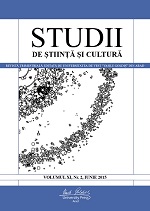CAPITALUL SOCIO-CULTURAL - BAZA STRATEGIILOR DE MUNCĂ ÎN FAMILIILE POSTCONFLICTUALE: CAZUL REPUBLICII SÂRBE şI KOSOVO DE NORD
SOCIO-CULTURAL CAPITAL AS THE BASIS OF WORKING STRATEGY OF HOUSEHOLD/FAMILY IN POST-CONFLICT SOCIETIES: THE EXAMPLE OF THE REPUBLIC OF SRPSKA AND THE
Author(s): Ivana Milovanović, Božo V. MiloševićSubject(s): Literary Texts
Published by: Editura Universităţii Vasile Goldiş
Keywords: socio-cultural capital; household; post-conflict/post-war society; post-socialist transformation; Republic of Srpska; Kosovo*.
Summary/Abstract: This paper represents the result of comparative research of socio-cultural capital features as the basis of working strategies of household/family in post-conflict societies of former SFRY/Western Balkan. Republic of Srpska and Kosovo* represent case studies due to a set of similarities which are inherent to those social frameworks, and certain specificities which are making them “original” cases in social researches. Our research results indicate a sort of retraditionalization of the role of post-war family members including their endeavour to maintain functionality and unity of family “at all costs” in societies of “high risk”. Besides, those results point to a set of other strategies individuals and their households undertake in order to preserve “normality” of everyday life in societies which are facing the prevailing nationalistic ideologies twenty or fifteen years after the open armed conflicts termination, which “hinder” the establishment of peaceful conditions for life and work. In the first part of the paper, we are indicating the timeline of events being shaped by the two mentioned societies in the form of post-war societies in order to visualize the importance of socio-cultural capital more clearly, as the condition to develop the working strategies of post-war family households.
Journal: Studii de Ştiinţă şi Cultură
- Issue Year: XI/2015
- Issue No: 02
- Page Range: 145-158
- Page Count: 14

